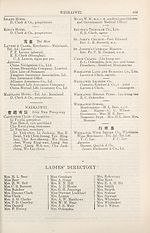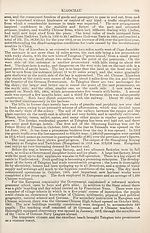1918
(774) [Page 700] - Kiaochau (Tsingtau)
Download files
Complete book:
Individual page:
Thumbnail gallery: Grid view | List view
![(774) [Page 700] - Kiaochau (Tsingtau)](https://deriv.nls.uk/dcn17/1949/0339/194903394.17.jpg)
KIAOCHAU (TSINGrTAU )
. «B Kiau-chau
Tsingtau, situated at the entrance to Kiaochau Bay in Shantung, was occupied by a.
German squadron on the 14th November, 1897, in consequence of the murder of two German
missionaries, and Germany obtained from China a lease of the territory for the term of
ninety-nine years. When the great war in Europe broke out in 1914, Japan, under
the terms of her treaty of alliance with Great Britain, intervened because the peace
of the Far East was menaced by the German occupation of Kiaochau, inasmuch as the
Colony constituted a naval base for operations in the East against the shipping and terri¬
tories of the countries with whom Germany was at war. Shortly after the outbreak of the
war Japan advised Germany to disarm all her armed vessels in Chinese and Japanese
waters, and to hand Kiaochau over to Japan with a view to its eventual restoration to-
China. Germanv returned no reply to this communication. Consequently on August
23rd Japan declared war against Germany, and took measures at once in co-operation
with the British to blockade and invest the German territory of Kiaochau. The
bombardment of the place by land and sea began on September 27th and the garrison
capitulated on November 7th after all the forts had been taken by a final night attack,,
in which the South Wales Borderers took part with the Japanese. H.M.S. Triumph and
the destroyers Usk and Kennett assisted in the naval operations. Upwards of 5,000
prisoners were taken and conveyed to Japan for internment until the end of the war.
While Kiaochau was in German occupation, the special attention of the Adminis¬
tration was devoted to agricultural, commercial and mining development in the-
Protectorate and Shantung. The local administration consisted of a Council, composed
of all the heads of the several administrative departments under the personal
supervision of the Governor and four members chosen from the civil population and
appointed for two years. The Protectorate developed to an unlooked-for extent under
this system of administration, which enabled all the vital questions at issue, such
as legal rights, landed properties, land tax assessment, school and Church matters, to
be satisfactorily settled. The object of the Administration in dealing with the land
question was to secure for every settler the lasting possession of his plot, thereby
opposing unhealthy land speculation. Tsingtau, on the 2nd September, 1898, was de¬
clared a free port. The harbour had all the advantages of a Treaty port, and as a free
port especially recommended itself as an emporium, since the merchant could there
store, free of duty, his wares from abroad or his raw materials brought from the
interior of China. The Chinese import duties were at first levied only on goods
brought to Tsingtau by sea, when they were transported beyond the borders of the
Protectorate into Chinese territory. The Chinese export duties were at first levie d
only on goods brought from the interior of China, when they were shipped from the
German Protectorate to any other place. But in 1906 a new Convention came into
force whereby Tsingtau ceased to be a free port, and the Imperial Maritime Customs-
began to collect duties there as at all the other Treaty ports of China. But the Conven¬
tion stipulated that 20 % of the money so collected at Tsingtau should be paid to the
Imperial German Government. The Commissioner of Customs in his report for 1906
C°i?irnen^e<^ 0n arrangement as follows :—“ The principal object of the arrangement,
which, moreover, afforded the opportunity of a political rapprochement and material
concessions for mutual benefit on both sides, was tne creation and promotion of trade
and^ commerce between the Pachtgebiet and-the Chinese hinterland. The results of the
nrst epoch have conclusively proved the wisdom of this novel arrangement. Under it
trade developed beyond expectation and rose from a value of 2 million Taels in 1899 to
22 millions m 1905, and Tsingtau, the former dilapidated fishing village, grew into a
handsome city with a flourishing mercantile community and a considerable number
ot manufacturing establishments, giving promise of good profits and further develop¬
ment. Its success emboldened the merchants, foreign and Chinese, to ask for, and the
Government to agree to, going a step further and arranging for the limitation of the free-
area, which formerly comprised the whole Pachtgebiet, to the harbour on much the
same lines as the German free ports Hamburg and Bremen. The chief advantage of
this step lies in the removal of Customs control from the railway stations to the free
. «B Kiau-chau
Tsingtau, situated at the entrance to Kiaochau Bay in Shantung, was occupied by a.
German squadron on the 14th November, 1897, in consequence of the murder of two German
missionaries, and Germany obtained from China a lease of the territory for the term of
ninety-nine years. When the great war in Europe broke out in 1914, Japan, under
the terms of her treaty of alliance with Great Britain, intervened because the peace
of the Far East was menaced by the German occupation of Kiaochau, inasmuch as the
Colony constituted a naval base for operations in the East against the shipping and terri¬
tories of the countries with whom Germany was at war. Shortly after the outbreak of the
war Japan advised Germany to disarm all her armed vessels in Chinese and Japanese
waters, and to hand Kiaochau over to Japan with a view to its eventual restoration to-
China. Germanv returned no reply to this communication. Consequently on August
23rd Japan declared war against Germany, and took measures at once in co-operation
with the British to blockade and invest the German territory of Kiaochau. The
bombardment of the place by land and sea began on September 27th and the garrison
capitulated on November 7th after all the forts had been taken by a final night attack,,
in which the South Wales Borderers took part with the Japanese. H.M.S. Triumph and
the destroyers Usk and Kennett assisted in the naval operations. Upwards of 5,000
prisoners were taken and conveyed to Japan for internment until the end of the war.
While Kiaochau was in German occupation, the special attention of the Adminis¬
tration was devoted to agricultural, commercial and mining development in the-
Protectorate and Shantung. The local administration consisted of a Council, composed
of all the heads of the several administrative departments under the personal
supervision of the Governor and four members chosen from the civil population and
appointed for two years. The Protectorate developed to an unlooked-for extent under
this system of administration, which enabled all the vital questions at issue, such
as legal rights, landed properties, land tax assessment, school and Church matters, to
be satisfactorily settled. The object of the Administration in dealing with the land
question was to secure for every settler the lasting possession of his plot, thereby
opposing unhealthy land speculation. Tsingtau, on the 2nd September, 1898, was de¬
clared a free port. The harbour had all the advantages of a Treaty port, and as a free
port especially recommended itself as an emporium, since the merchant could there
store, free of duty, his wares from abroad or his raw materials brought from the
interior of China. The Chinese import duties were at first levied only on goods
brought to Tsingtau by sea, when they were transported beyond the borders of the
Protectorate into Chinese territory. The Chinese export duties were at first levie d
only on goods brought from the interior of China, when they were shipped from the
German Protectorate to any other place. But in 1906 a new Convention came into
force whereby Tsingtau ceased to be a free port, and the Imperial Maritime Customs-
began to collect duties there as at all the other Treaty ports of China. But the Conven¬
tion stipulated that 20 % of the money so collected at Tsingtau should be paid to the
Imperial German Government. The Commissioner of Customs in his report for 1906
C°i?irnen^e<^ 0n arrangement as follows :—“ The principal object of the arrangement,
which, moreover, afforded the opportunity of a political rapprochement and material
concessions for mutual benefit on both sides, was tne creation and promotion of trade
and^ commerce between the Pachtgebiet and-the Chinese hinterland. The results of the
nrst epoch have conclusively proved the wisdom of this novel arrangement. Under it
trade developed beyond expectation and rose from a value of 2 million Taels in 1899 to
22 millions m 1905, and Tsingtau, the former dilapidated fishing village, grew into a
handsome city with a flourishing mercantile community and a considerable number
ot manufacturing establishments, giving promise of good profits and further develop¬
ment. Its success emboldened the merchants, foreign and Chinese, to ask for, and the
Government to agree to, going a step further and arranging for the limitation of the free-
area, which formerly comprised the whole Pachtgebiet, to the harbour on much the
same lines as the German free ports Hamburg and Bremen. The chief advantage of
this step lies in the removal of Customs control from the railway stations to the free
Set display mode to:
![]() Universal Viewer |
Universal Viewer | ![]() Mirador |
Large image | Transcription
Mirador |
Large image | Transcription
Images and transcriptions on this page, including medium image downloads, may be used under the Creative Commons Attribution 4.0 International Licence unless otherwise stated. ![]()
| Asian directories and chronicles > 1918 > (774) [Page 700] - Kiaochau (Tsingtau) |
|---|
| Permanent URL | https://digital.nls.uk/194903392 |
|---|
| Attribution and copyright: |
|
|---|---|
| Description | Volumes from the Asian 'Directory and Chronicle' series covering 1917-1941, but missing 1919 and 1923. Compiled annually from a multiplicity of local sources and research. They provide listings of each country's active corporations, foreign residents and government agencies of all nationalities for that year, together with their addresses. Content includes: various treaties; coverage of conflicts; currencies and taxes; consular fees; weights and measures; public holidays; festivals and traditions. A source of information for both Western states and communities of foreigners living in Asia. Published by Hongkong Daily Press. |
|---|---|
| Shelfmark | H3.86.1303 |
| Additional NLS resources: |

